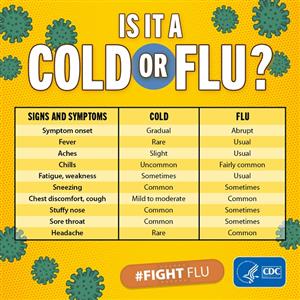-
Preventing Seasonal Flu
The first and most important step in preventing flu is to get a flu vaccine each year. Flu vaccine has been shown to reduce flu related illnesses and the risk of serious flu complications that can result in hospitalization or even death. CDC also recommends everyday preventive actions (like staying away from people who are sick, covering coughs and sneezes and frequent handwashing) to help slow the spread of germs that cause respiratory (nose, throat, and lungs) illnesses, like flu.
-
Period of Contagiousness
You may be able to spread flu to someone else before you know you are sick, as well as while you are sick.
- People with flu are most contagious in the first 3-4 days after their illness begins.
- Some otherwise healthy adults may be able to infect others beginning 1 day before symptoms develop and up to 5 to 7 days after becoming sick.
- Some people, especially young children and people with weakened immune systems, might be able to infect others for an even longer time.
-
What is Influenza (Flu)?
Flu is a contagious respiratory illness caused by influenza viruses that infect the nose, throat, and sometimes the lungs. It can cause mild to severe illness, and at times can lead to death. The best way to prevent flu is by getting a flu vaccine each year.
Flu SymptomsInfluenza (flu) can cause mild to severe illness, and at times can lead to death. Flu symptoms usually come on suddenly. People who have flu often feel some or all of these symptoms:
- fever* or feeling feverish/chills
- cough
- sore throat
- runny or stuffy nose
- muscle or body aches
- headaches
- fatigue (tiredness)
- some people may have vomiting and diarrhea, though this is more common in children than adults.
*It’s important to note that not everyone with flu will have a fever.
More information is available at Flu and COVID-19 symptoms.
-
Diagnosing Flu
It is very difficult to distinguish flu from other viral or bacterial respiratory illnesses based on symptoms alone. There are tests available to diagnose flu. More information is available: Diagnosing Flu.
Treating FluThere are influenza antiviral drugs that can be used to treat flu illness.
For More information, please go to https://www.cdc.gov/flu/about/index.html


